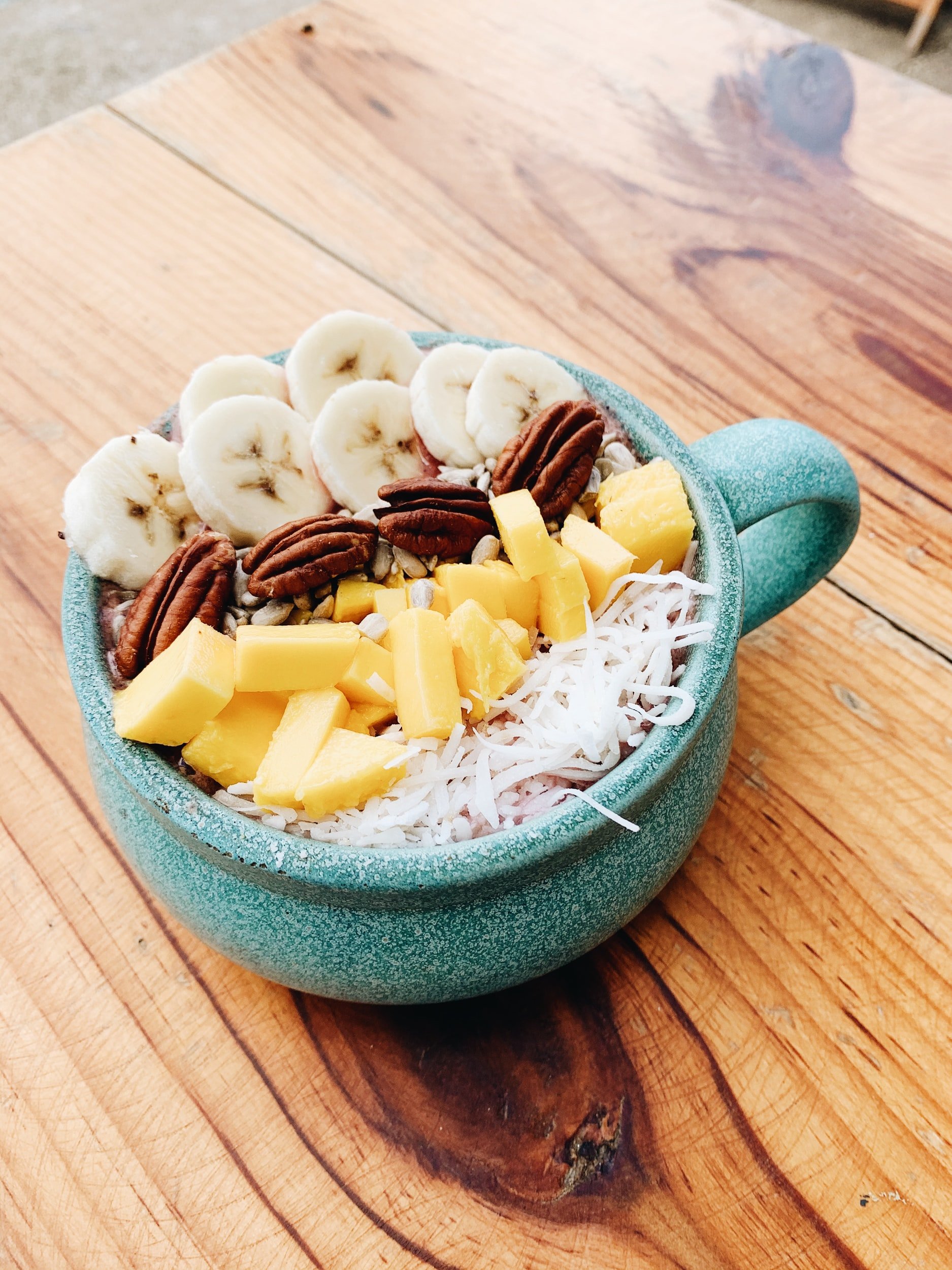What should you eat to lose weight?
It’s the trillion dollar question everyone is asking because…
If we just knew what to eat to lose weight, we would eat it, right?
I’m actually not so sure.
But before we get too far, I want to let you know what you can expect from this article.
I’m going to tell you that losing weight is mostly about calories - not the specific foods you eat, which makes the question, “What should I eat to lose weight?” quite complex.
I’m going to help you think through that reality by using a financial analogy that relates calories consumed to dollars spent.
I’m going to tell you which foods I think are “best” for fat loss for those who appreciate practical suggestions.
I’m going to tell you which foods make up the majority of my own diet when I aim to lose weight on purpose.
MOST PEOPLE ALREADY UNDERSTAND BASIC NUTRITION
In my opinion, most people have a basic understanding of which foods tend to be best for fat loss.
For example, if we gave the entire planet a questionnaire about basic nutrition, I think we’d see that…
Most people know that oatmeal with berries and a few tablespoons of chia seeds is a fat loss-friendly breakfast.
Most people know that salads with lean proteins and modest portions of healthy fats are helpful, fat loss-friendly lunch options.
Most people know that tofu, broccoli, and rice can be a fat loss-friendly dinner combination.
And most people know that snacking on apples is probably more fat loss-friendly than eating Nutella straight out of the jar.
So where’s the disconnect?
Why are people still typing “what to eat to lose weight” into Google?
I could be wrong, but I think I know why.
In fact, it’s the reason I wrote an entire article called The Single Biggest Mistake You’re Making in How You Think About Fat Loss, but I’m committed to bringing you an updated perspective on the topic of food selection for weight loss.
Are you ready for it?
The problem with focusing exclusively on what you should eat is that there's little to no consideration of how much you should eat.
So the implication is that you can eat all of the “right foods” and yet never lose weight if you eat them in the “wrong amounts.”
This is why thinking of your caloric allotment for the day as a monetary budget can be a very helpful analogy for fat loss.
THINK OF YOUR CALORIC INTAKE AS A MONETARY BUDGET
We’re going to start thinking about calories like dollars.
To start, let’s use an example of someone with a maintenance calorie intake of 2,500 calories, and let’s say their goal is to lose weight.
We’ll also use a direct conversion of calories to dollars for the sake of making this analogy as easy to understand as possible.
So now, instead of eating 2,500 calories per day, we’re going to think of our example person as spending $2,500 per day.
Sound fun?
Just pretend our example person is Warren Buffet for a moment.
The first thing we need to do is tailor their new budget to their goal.
In this analogy, think of saving money as losing fat.
So, if we want to lose fat by 10%, all we need to do is reduce their daily spending by 10%, which would shift their current budget of $2,500 per day to a more prudent $2,250 per day.
Over the course of a week, they would save about $1,750. And, over the course of a month, they would save about $7,000, which is about two pounds of fat once we abandon our analogy.
And this is essentially exactly how weight loss works.
It’s like you’re a little kid being given an allowance of $2,250 per day and you can spend it however you want, but…
Once it’s gone, it’s gone.
To further the analogy, that means that spending more than your allotted $2,250 per day means you’ve put yourself in debt, and debt (in this particular analogy) negates any weight loss attempt and could even lead to weight gain depending on the magnitude of that debt.
The more debt you accrue, the more unwanted body fat you accumulate.
Interestingly enough, buying things on credit is a thing when it comes to dieting for fat loss, but credit (in this analogy) is stored body fat.
And finally, perhaps one of the most important implications of this analogy is that it really doesn’t matter how you spend your money as long as you stay within the budget.
Hear me out.
Some might be tempted to think it’s “better” to spend your budgeted money on things like your mortgage, utilities, food for your family, and clothes to put on their backs, but you technically could go spend it on strippers and cocaine as long as you can afford it.
Stick with me.
But it’s only “better” in the sense that it’s better for your overall wellbeing. Most people would probably agree that the way to flourish in life probably isn’t to spend your evenings frequenting seedy nightclubs and “doing lines” off of Tiffany’s lower back.
But it’s technically not “better” if the goal is simply to stay within your budget (at least in the short-term).
That being said, if you have a goal of staying within your budget and living a responsible life, then you would be smart to consider your purchases as more than “just pennies.”
So I’ll say it again.
It really doesn’t matter (much) how your spend your money if your only goal is to stay within the budget.
And this is the essence of flexible dieting, which is a popular dietary pattern that communicates this very same idea within the context of food.
WHAT’S FLEXIBLE DIETING?
Flexible dieting or the “If It Fits Your Macros” (IIFYM) movement says that…
If your caloric budget for the day is 2,250 calories, you really are free to consume those calories from whichever food sources you please if weight loss is all you care about (which is an important caveat).
Jelly-filled donuts? Yep.
Pizza? Yep.
Burgers and fries? If you must.
Cake and ice cream? Yes!
However, if you want that lean, hard-body look that we help people achieve here at IVRY, you’ll need to make sure you’re ticking a few more important boxes within your flexible dieting routine.
After all, there’s a big difference between weight loss and body recomposition.
It’s probably good to mention too that a flexible dieting approach doesn’t take your health into consideration either, which is why I prefer to encourage people to eat a whole food, plant-based diet as much as possible.
So what’s the takeaway from this section of the article?
Calories matter most for weight loss. Consume them however you please within your caloric allotment.
The Truth about Which Foods Are “Best” for Weight Loss
Once you understand that weight loss is mostly about the manipulation of your overall caloric intake, you’ll slowly realize that the only intelligent answer to the question regarding which foods are “best” for weight loss is…
That there are no specific foods that you should eat to lose weight.
I hope this is powerful and illuminating!
But, there are, of course, foods that tend to make weight loss much easier and more sustainable due to a few reasons:
They're naturally lower in calories.
They're voluminous.
They're satiating, which means they leave you feeling full for longer.
They’re usually plants.
They work really well for your own personal preferences and lifestyle.
In my opinion, the following list of foods fit most of these categories I’ve just mentioned.
Do you have to eat them? No.
Should you feel limited to only eat these foods? Not at all.
If anything, I’m just giving you a brief peek into my own life and the foods I personally choose to consume on a regular basis in order to maintain my lean, hard-body physique.
And, if you didn’t already know, I do eat a 100% plant-based diet, which means you won’t see any animal products in the list below (although you certainly can use them to lose weight).
FOODS I EAT MOST often FOR FAT LOSS AND MUSCLE GAIN
Oats
Berries like strawberries, blueberries, and blackberries
Other fruits like bananas, mangos, and cherries
Plant “milks” like soy “milk” and almond “milk”
Nuts like walnuts, pecans, and pistachios
Nut butters like peanut butter and almond butter
Seeds like hemp seeds, chia seeds, flax seeds, and pumpkin seeds
Enormous salads made primarily with a spring mix or spinach
Tahini
Tofu and tempeh
Sweet potatoes
Vegetables of all kinds
Rice (or quinoa) and bean combinations
Burritos
Chickpea and lentil-based pastas
Nutritional yeast
Chilis
Plant-based protein powders
Plant-based protein bars
And there are certainly many more, but this is just a list of the major players.
Remember, the reason it's good to focus on foods that are low-calorie, voluminous, and filling is because being in a caloric deficit is what drives weight loss, and foods with these qualities make it easier to maintain being in a caloric deficit for as long as it takes for you to get rid of your unwanted fat.
That being said, you can totally enjoy less “traditional” dieting foods like pizza or ice cream or brownies as long as you stay within your caloric budget.
At the end of the day, calories matter most for weight loss.
You don't need to make it any more complicated than that unless you’re interested in optimizing your weight loss effort and your health.
Summary
There are no foods you should consume for weight loss since calories matter most for weight loss. It’s primarily a discussion of “how much” versus “which foods.”
That being said, I personally think everyone would benefit from a health perspective from eating most of their calories from whole or minimally-processed plant foods.
It’s important to remember that weight loss and improved health are not always synonymous.
It can be helpful to think of weight loss in terms of a monetary budget.
It’s probably easiest to lose weight when you consume the majority of your calories from plant foods that are naturally low in calories, voluminous, and satiating.
This also probably leads to better health outcomes, but this is outside of the scope of this particular article and beyond my expertise.
Certain foods like pizza, burgers, fries, and ice creams can be difficult to incorporate into a weight loss effort due to their caloric density, but it’s still doable when your overall caloric intake is kept in check.
This is commonly referred to as flexible dieting, and can be a very useful strategy for many people.
I really enjoyed writing this short article, so if you found it helpful, do me a favor and send it to that person in your life who seems eternally perplexed about why they can’t ditch their muffin top for a trimmer midline.
Until next time,
-Andrew








